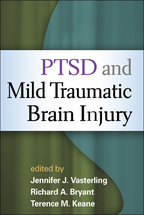 by Edited by Jennifer J. Vasterling, Richard A. Bryant, and Terence M. Keane
by Edited by Jennifer J. Vasterling, Richard A. Bryant, and Terence M. Keane
Events that lead to traumatic brain injury are often also psychologically traumatic. Addressing a growing need among mental health practitioners, this authoritative book brings together experts in both posttraumatic stress disorder (PTSD) and mild traumatic brain injury (mTBI).
Full Description:
Events that lead to traumatic brain injury are often also psychologically traumatic. Addressing a growing need among mental health practitioners, this authoritative book brings together experts in both posttraumatic stress disorder (PTSD) and mild traumatic brain injury (mTBI). Chapters present empirically based best practices for conceptualization, assessment, and intervention. The book also addresses the biological and psychosocial mechanisms by which PTSD and mTBI complicate each other; management of commonly associated conditions, including chronic pain and substance abuse; special considerations in military contexts; and possible ways to improve the structure and cost-effectiveness of providing care in this challenging area.
308 Pages Size: 6" x 9"
- I. Introduction
1. Understanding the Interface of Traumatic Stress and Mild Traumatic Brain Injury: Background and Conceptual Framework, Jennifer J. Vasterling, Richard A. Bryant, and Terence M. Keane
-
II. Clinical Presentations and Mechanisms
2. Understanding Mild Traumatic Brain Injury: Neuropathology and Neuroimaging, Erin D. Bigler and William L. Maxwell
-
3. A Biopsychosocial Conceptualization of Poor Outcome from Mild Traumatic Brain Injury, Grant L. Iverson
-
4. Understanding Posttraumatic Stress Disorder: Implications for Comorbid Posttraumatic Stress Disorder and Mild Traumatic Brain Injury, Jasmeet Pannu Hayes and Mark W. Gilbertson
-
5. Effects of Traumatic Brain Injury–Associated Neurocognitive Alterations on Posttraumatic Stress Disorder, Mieke Verfaellie, Melissa M. Amick, and Jennifer J. Vasterling
-
III. Commonly Associated Conditions
-
6. Chronic Pain, John D. Otis, Catherine B. Fortier, and Terence M. Keane
-
7. Substance Use Disorder, Lisa M. Najavits, Jennifer Highley, Sara L. Dolan, and Frank A. Fee
-
IV. Clinical Management
-
8. Assessment, Erin W. Ulloa, Brian P. Marx, Rodney D. Vanderploeg, and Jennifer J. Vasterling
-
9. Assessment in Contexts That Threaten Response Validity, Jon D. Elhai, Jerry J. Sweet, Leslie M. Guidotti Breting, and Danny Kaloupek
-
10. Treatment of Mild Traumatic Brain Injury, Jennie Ponsford
-
11. Treatment of Posttraumatic Stress Disorder Following Mild Traumatic Brain Injury, Richard A. Bryant and Brett T. Litz
-
12. Implications for Service Delivery in the Military, Richard A. Bryant, Carl A. Castro, and Grant L. Iverson
-
13. Estimating the Costs of Care, Ann Hendricks, Maxine Krengel, Katherine M. Iverson, Rachel Kimerling, Carlos Tun, Jomana Amara, and Henry L. Lew
-
V. Conclusions
-
14. Understanding the Interface of Traumatic Stress and Mild Traumatic Brain Injury: Future Directions in Science and Clinical Practice, Jennifer J. Vasterling, Richard A. Bryant, and Terence M. Keane
|